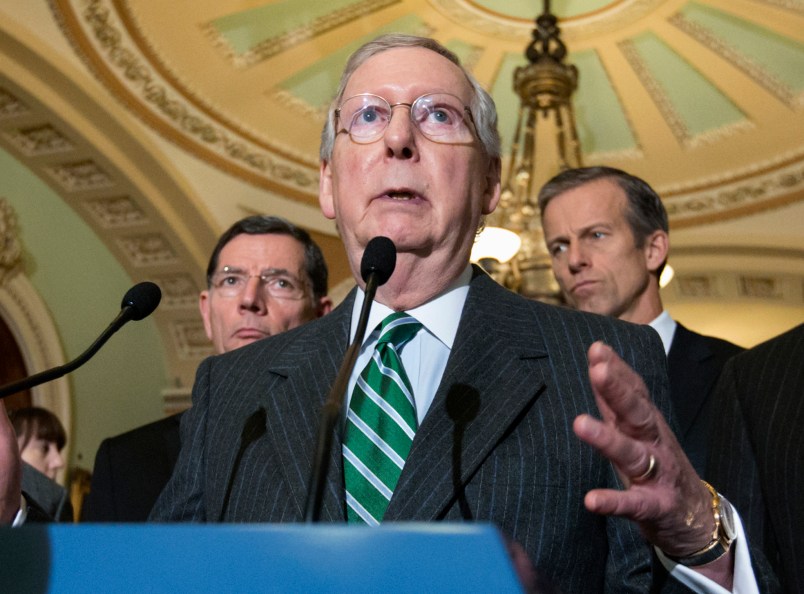TPM Alum Sahil Kapur has an interesting piece up this afternoon on what he calls growing signs of Republican division over Supreme Court tactics. It’s a good piece and you should read it. I think it is right to note that ‘tactics’ is definitely the issue here. There’s little reason to believe that there’s any division on the goal of preventing Barack Obama from choosing Antonin Scalia’s successor. The issue is whether the official position outlined by Majority Leader Mitch McConnell is simply too brazen and unvarnished for some Republicans to sign on to – particularly swing state senators up for election in 2016.
As I noted earlier, it’s not like there’s not a straightforward way to deny Obama this nomination without saying so: just find catastrophic fault with anyone he nominates and run out the clock over the course of the year. It’s true that Senate caucuses of both parties – but much more the Republicans – have slow-rolled appointees to lower courts. But these appointments aren’t things that anyone but close watchers of Courts know anything about. So it’s purely inside baseball. But the public understands what a Supreme Court vacancy is and that they need to be filled. The President nominates someone and the Senate votes them up or down. Most people get that if you just say you won’t even hold a hearing or take the time to vote the nominee down, you’re not doing your job.
Imagine if in a different Court constellation, dropping down to eight Justices was actually better for the Democrats than a Court with any ninth Justice the Senate would confirm. Then imagine that President Obama just said, ‘I’m good with eight. I’m not going to nominate anyone.’
Put the shoe on the other foot and nonsensical nature of the proposition becomes clear.
But the point that jumped out to me in Sahil’s article were the comments about strategy from those trying to hold the GOP line about no hearings, no votes at all. The comments are extremely revealing.
Here’s an extended quote …
“Our strongest strategy is to not have hearings,” Curt Levey, the executive director of FreedomWorks Foundation and a veteran of past Supreme Court nomination fights, told reporters on a conference call. “This is about the right of the American people to wait until November. … To hold a hearing is to put the focus on the nominee rather than the situation.”
…
In a blog post on Tuesday titled “How Republicans Can Win the Supreme Court Media Battle,” GOP communications strategist Rory Cooper argues that Republicans should seek to “starve the media of this story” by avoiding any discussion of “the credentials of the nominee.”
“So, no statements, no meetings with the nominee, no hearings, no comment on his or her qualifications…no oxygen. Stick to the process,” he wrote. “And make it boring.”
This, I suspect, is the essence of McConnell’s quick, no hearing, no vote, no nuthin strategy. Once you start a process it’s hard not to play it out. Like, you’re not even willing to vote? The process has a natural life and trajectory of its own. The President nominates. The Senate holds a hearing and then there’s a vote. Confirm or reject. Each increment along the way opens up a new “Why aren’t you just doing it?” question – especially for Republican senators in close races.
In a sense this is not altogether different from the strategy Democrats adopted to block Social Security privatization in 2005. At the time, no negotiation over a bad idea with a more powerful party (the President and his congressional majorities) was going to go well. Better to refuse to enter the conversation at all – not grant it any legitimacy.
The other issue above is the reference to credentials, which may be the key point.
Republican strategists certainly realize that whatever their candidates say on the campaign trail about Obama’s extremist ideology, he is quite likely to nominate someone with impeccable credentials whose record will give very little room for credible criticism. That’s not just strategic; it’s in Obama’s nature, as an institutionalist and a credentialist who is temperamentally conservative. Indeed, he’s quite likely to nominate someone who Senate Republicans quite recently voted for.
One frequently mentioned possibility is Sri Srinivasan, who was confirmed unanimously by the Senate for a seat on the DC Court of Appeals in 2013 – a post which is frequently a launching pad for judges who are later nominated to the Supreme Court. You can see Cooper and Levey’s point that Senate Republicans don’t want an extensive discussion of Srinivasan’s qualifications since his unanimous confirmation three years ago basically speaks for itself.
None of this makes me think that Republicans are about to give way and hold a vote, let alone place Obama’s nominee on the Court. But I think we are seeing significant cleavages, ones that show that McConnell’s flat line may play with the GOP base but not with swing voters many Republican senators need to get reelected. That is a tension point that Republican strategists are trying to avoid, and it’s one Democrat need to press hard over time.






